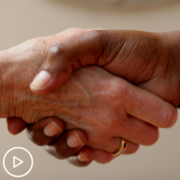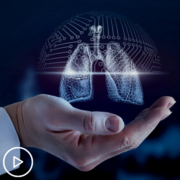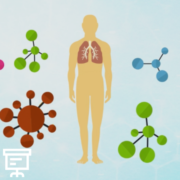New and Improved Lung Cancer Treatment Options
New and Improved Lung Cancer Treatment Options from Patient Empowerment Network on Vimeo.
Are there new lung cancer treatment options that you should know about? Expert Dr. Heather Wakelee reviews the latest research. Looking for more information? Download the Find Your Voice Resource Guide here.
Heather Wakelee, MD is Professor of Medicine in the Division of Oncology at Stanford University. More about this expert here.
See More From the The Pro-Active Lung Cancer Patient Toolkit
Related Programs:

Lung Cancer Treatment Decisions: Which Path is Best for You? |

|

|
Transcript:
Dr. Wakelee:
So, the treatment of lung cancer has been changing very, very quickly. We’ve had a lot of new options that have become available in the last few years, and there’re new ones coming along all the time. When I started treating lung cancer, which was a number of years ago, we were able to treat and help people.
But our only real option when the cancer was metastatic was chemotherapy. Chemotherapy is still an important part of treatment for many people, but now we have other options. So, starting about 15 years ago, people were able to identify that some tumors had specific genetic changes. We also call these molecular changes, or gene mutations, or just mutations in the tumor. They have a lot of different names.
But when we do find them, these are things like EGFR or ALK or ROS or BRAF or MET, we actually have different treatment options that only work for tumors that have those specific genetic changes, and don’t work in tumors that don’t have those. So, when we talk about genetic changes a lot of people think, “Oh, that’s something that I’ve inherited.”
These are not things that are inherited. This is not something that’s in the whole person. It’s just in the tumor. So, it’s a mutation that happened in the DNA of the cell, and that cell then became the cancer. And depending on what that mutation or mutations are, we still can have chemotherapy, and that can work.
But for specific ones, and specifically EGFR, ALK, ROS, BRAF, we know that there are pill drugs and oral medication that actually is gonna be better than chemo, at least for a period of time, if a cancer has that specific mutation.
So, it’s really, really important to figure that out. It’s not something a doctor can sort out just by looking at the patient or looking at the tumor under the microscope. We have to do special testing, looking at the tumor DNA.
And we now have ways of looking for those mutations, not just in the tumor tissue, but also sometimes with blood. So, we can draw a blood test and look for those as well when there’s a tumor that’s shedding the DNA. So, it’s really important to think about that. And we now have a whole host of medications that we can offer people when we the find these mutations that we didn’t used to have, even a few years ago.
And, actually, if you think back over the last five years, we’ve had new drugs approved, a few of them every year, for these specific gene mutation tumors, so that’s really, really exciting. The other thing that’s changed dramatically just in the last five years is what we call immune therapy.
So, when we think about the different types of treatment, chemotherapy works by poisoning DNA. And in order to make a new cell, you have to make new DNA. Tumors are doing that more than a lot of normal tissue, and so we’re able to give chemotherapy and specifically hurt tumors and not the rest of the person very much.
With the targeted treatments where we find a gene target and where there’s a gene mutation in a tumor, those are medications that specifically hit that altered gene, that altered protein made by the gene. And then they work really, really well. What immune therapy does is it actually changes the way your body’s own immune system interacts with the tumor. So, we have a lot of types of immune cells, but the ones that are involved in really fighting the cancer directly are called T cells.
And so, normally, a T cell would recognize something that’s foreign like an abnormal-looking cell that’s a cancer, and attack it. But we have a lot of different systems in our body that stop the T cells from recognizing normal tissue and attacking it.
And one of the best systems for that is something called PD-1 and PD-L1. And so, if you have a T cell and it sees a PD-L1 signal on tissue, it assumes that that tissue was normal tissue and it doesn’t attack. But if you can hide that PD-L1 signal, then if it’s a T cell, a part of the immune system comes in and doesn’t see the PD-L1, it doesn’t get the stop signal. It’s not told to not attack. So, it could attack the tumor better.
And I’m not describing it well because it’s so complicated. There are a lot of different factors that help a T cell know whether to attack or not to attack. But, again, one of these key stop signals is the PD-1, PD-L1 interaction. And so, scientists were able to develop medications that can block PD-1 or PD-L1. And when those medications are in the body, if a tumor is using that particular stop signal as a way to hide from the immune system, when you give the medication that blocks it then the tumor is no longer hiding.
And then the immune system, those T cells, can come in and attack. So, these immune treatments, and there are now a lot, and so these are drugs, like pembrolizumab, also called Keytruda; nivolumab, which also called Opdivo; durvalumab, which is called IMFINZI. And there are many, many others. Those medications have now been shown to really, really help to fight cancer, particularly when the tumor is using that PD-L1 signal. But they can also be combined with chemotherapy and then they work even if there’s not a lot of PD-L1 in the tumor. So, again, it’s a very complex story.
But where we’ve seen dramatic improvements in treatment is we have targeted treatments when the genes are – there are specific genes mutating in tumors. We have immune therapy, which worked for a lot of other people. And sometimes when there’s also gene mutation, but not always, we still have chemotherapy. And then there’s ongoing research with a lot of different medications. Many of them are focusing on better ways to get the immune system to work against cancers beyond what we can already do.













